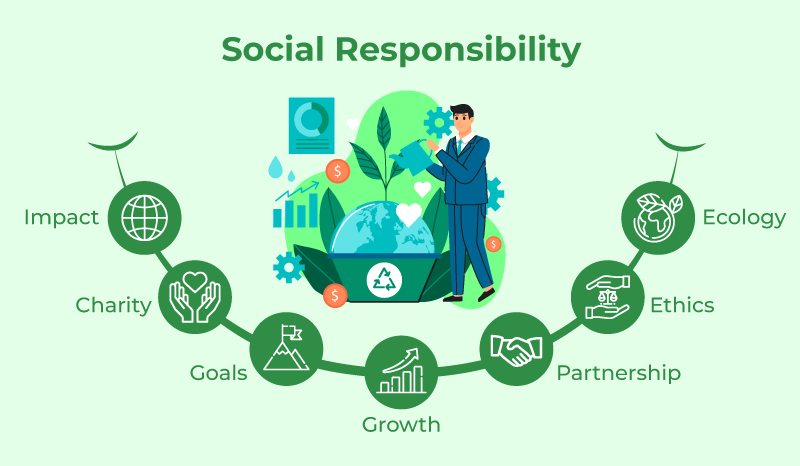Today’s insights are brought to you by my colleague and global futurist, Dean van Leeuwen.
“You never change things by fighting the existing reality. To change something, build a new model that makes the existing model obsolete” – Buckminster Fuller
In an era of heightened societal expectations and global challenges, corporate responsibility is no longer just a moral obligation; it’s a strategic imperative. Leaders are increasingly recognizing that businesses can’t thrive in isolation. By integrating social responsibility into their core business strategies, they can create sustainable competitive advantages, generate economic value, and contribute meaningfully to the betterment of society.
This shift towards a new paradigm of business for good is not only ethical but also economically sound, offering a path to long-term success in a world that demands more from its corporations.
Environmental giving should be part of every business strategy.
In August 2019, the Business Roundtable, an association of chief executive officers of America’s leading companies, catapulted into the mainstream the principles of doing well, by doing good.
Signed by 181 CEOs, the Business Roundtable announced the release of a new Statement on the Purpose of a Corporation committing them to lead their companies for the benefit of all stakeholders – customers, employees, suppliers, communities, and shareholders.
Conscientious capitalism, stakeholder capitalism, B-Corporations, Benefit Corporation, business, doing well by doing good, purposeful business or business with a social impact; the movement for business that serves not just stakeholders has rapidly gained momentum since the Great Recession of 2008.

Today we are witnessing a massive paradigm shift in thought leadership in terms of what makes companies competitive as well as contributors to society.
“The desire to balance profit and purpose is arguably a return to the model that many American companies once followed,” argues James Surowiecki, a journalist with The New Yorker magazine. “Henry Ford declared that, instead of boosting dividends, he’d rather use the money to build better cars and pay better wages. And Johnson & Johnson’s credo, written in 1943, stated that the company’s ‘first responsibility’ was not to investors but to doctors, nurses, and patients.”
The forces changing how leaders think about their business are being driven not only by people but also by market opportunities. The Global Goals or SDGs promise to release $30 trillion per year in value to businesses. When the biggest problems in the world also begin to become the greatest business opportunities it is not surprising that CEOs take notice.
The reality is if we want to solve a lot of our big social and environmental problems, we need the private sector to play a role because fixing these problems requires scale.
Leaders who wish to make a difference to the bottom line as well as deliver meaningful benefits to their co-workers, customers and society are discovering businesses who place doing well by doing good as central to their strategy and corporate DNA are well placed to seize opportunity.
Fortune magazine explains that doing well, by doing good, “is not meant to be a ranking of the overall ‘goodness’ of companies or of their ‘social responsibility.’’ Rather they explain, “Big corporations are complex operations that affect the world in myriad ways. The goal is simply to shine a spotlight on instances where companies are doing good as part of their profit-making strategy, and to shed new light on the power of capitalism to improve the human condition.”
Which brings us to corporate social responsibility. “Corporate leadership is not just about attracting investors; it’s also about doing what’s right for business. Current trends go beyond previous models of corporate social responsibility precisely because more companies see that a focus on social and environmental impact affects the bottom line,” says Judith Rodin, the president of the Rockefeller. Giving away a percentage of profit to charity does not go far enough, rather perpetuates an outdated shareholder primacy model.
Increasingly companies which are on quests to deliver meaningful benefits are going to end up making a lot of money. According to Rodin, “the assets managed under socially responsible principles doubled to more than $6 trillion between 2012 and 2014.” And, by 2018 this figure had skyrocketed to over $30 trillion. Business leaders are discovering that institutional investors are rewarding CEO with a focus on the longer-term benefits of environment, social and governance. The Digital Generation (Gen Y & Z), are also a strong driving force with 92 percent believing that a business’s purpose extends beyond profit.”
As Peter Drucker said, “The best way to predict the future is to create it.”
Leaders now have a choice about the future: continue to perpetuate the old capitalist paradigm or become part of a new paradigm for creating sustainable competitive advantage, economic value and wealth that delivers meaningful benefits across society and the world.
Connect with our consulting team, or visit our website, to dive for more on business as a force for good and leading purpose-driven organisations.
The team at TomorrowToday Global has committed to donating 1% of our annual sales to environmental organisations through our membership with 1% for the Planet. You can read more about two projects that we currently support here and here.
Dean van Leeuwen is the co-founder of TomorrowToday Consulting – a futurist consultancy working with leading organisations around the world. He is an expert on global trends, innovation, and strategic business transformation.
You can access Dean’s latest research on ‘Closing the Innovation Gap – The 7 strategic and cultural essentials that separate successful large-company innovator’s here or chat with us about our ‘Full blown innovation’ keynote presentation.
At TomorrowToday Consulting we partner with our clients to proactively create the future. Our unique approach involves developing strategies that turn high impact yet often ignored forces of change into ground-breaking opportunities, all while fostering the culture and capabilities needed to drive sustainable and transformative change.



